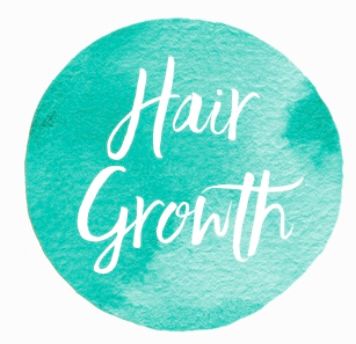
Hair Growth
Menopause can bring unexpected changes to hair texture & manageability alongside increased hair loss, but it's not something many of us know much about. Any new hair growth may be wispy and fine, coarse and wiry, or stubbornly growing in the opposite direction. Individual strands become thinner, increasing the impression of hair loss. It’s not surprising that women can find this a psychologically challenging symptom, that affects self-confidence. “Never going to give you up”.... sums up how we feel about our crowning glories!
WHY NOW?
Menopausal hormone imbalance can disrupt your hair’s growth cycle. The growing phase (Anagen) lasts between two to six years, before each hair enters a three-month resting phase (Telegen), when it detaches from the follicle and falls out.
You've approximately 100,000 follicles on your head. In perimenopause, you’ll lose between fifty to one hundred hairs a day. Hitting menopause, approximately 15% of your hair is in the resting phase, meaning heavy hair loss. New hair coming through may be grey as levels of melanin, the hormone responsible for colour, drop.
This is not necessarily exclusive to the hair on heads, it's the same for all body hair! Fluctuating hormones mean that you may find you develop hairs in unawanted places and that your pubic hair becomes more threadbare and patchy.
And the good news is….
Hair loss is treatable, and in most cases, should be reversed once hormones have settled down, and you’re through the menopause. Take the chance to give yourself a new look to boost your self-esteem.
BE PROACTIVE
The best ways to help deal with menopause hair loss
Managing hair loss caused by menopause takes time and patience as hair goes through its growth cycle. Give any intervention time to work. Nourishing your body with healthy foods, and using the right products, should make a difference. Act as soon as you notice thinning to help prevent further loss and improve growth.
What to eat to help with menopause and hair loss
Your hair needs a balanced, nutritious diet to stay healthy. Deficiencies in certain vitamins and minerals can cause hair loss.
Protein: supports hair growth. Eat more: legumes (beans, lentils, peas, peanuts, soybeans), chicken, red meats, cottage cheese, yogurt, tofu, almonds, fish,
Seeds: plant-based protein, full of essential fatty acids: sesame, pumpkin, sunflower and flax.
Iron: carries oxygen in the blood helping hair follicle cell growth. Eat more: leafy greens, legumes, eggs and dried fruit.
Zinc: too much or too little have been linked with hair loss. Eat more: chicken, egg yolk, pumpkin seeds, cashews and spinach.
Biotin: a B vitamin that may help healthy hair. Eat more: almonds, nuts, legumes, eggs and wholegrains.
Omega-3 deficiency may be linked to menopause hair issues. Eat more SMASH: salmon, mackerel, anchovies, sardines and halibut. Milled linseeds and pumpkin seeds.
Vitamin A: helps improve hair condition: found in broccoli, kale, spinach and Brussels sprouts. Vitamin B12: deficiency linked to hair loss. Eat more: chicken, shellfish, salmon and eggs.
Vitamin D: may help create new hair follicles. Found in a limited number of foods, eat more: eggs, oily fish, fortified cereals and spreads.
Vitamin E: helps blood circulation for follicles. Eat more: Nuts, seeds, oil and avocado.
Turmeric: inhibits an enzyme that causes hair follicles to die. Use as a powder, or grate fresh roots into stews, curries, chilli, scrambled eggs, omelettes, soups and smoothies or add it to herbal teas.
What to avoid to help with menopause and hair loss
Cigarettes and Alcohol Both are toxic to your skin. Most of the research has been done on the link between male baldness and smoking, but it may be reasonable to assume there could be a similar link for women.
Heat horror Limit exposure to heat in dryers, tongues, curling wands, and straighteners as it damages weakened follicles and already brittle hair. Let’s be realistic, most of us need a little bit of heat to make hair look acceptable. Towel and air-dry as much as you can before turning on the heat.
Chemical reaction Colours and highlights damage hair and its follicles. Hormonal imbalance causes some women to react more violently to these chemicals. It’s up to you if you can give up on colouring your hair! But it might be time to follow trend-setting models Sam Gold and Pam Lucas, who regularly feature in The Sunday Times and Guardian style sections, rocking the grey look.
Rough stuff Brush gently with a soft brush or a Tangle Teezer. Yanking hair into a ponytail can stress the hair follicle. The first sign of hair loss may be that thinning pony tail. Perhaps it could be time to abandon this style for the benefit of your hair?
Lifestyle & wellbeing to help with menopause and hair loss
Stress reduction
Hair loss is exacerbated by stress. Hormone imbalance can cause hair loss, which is stressful and that stress may cause more loss, a classic vicious circle. Find your own stress relief: deep breathing, exercise or yoga to help reduce stress levels.
Exercise
Reduces stress, improves sleep and helps with blood circulation, which in turn benefits hair follicles. Stretching poses in yoga are great for de-stressing, getting your head below your heart, and helping blood to get to the scalp. Watch our Yoga with Annie – Stretching Exercises. Aerobic exercise that reduces stress can help in any plan to deal with hair loss.
Supplements worth trying for menopause and hair loss
You should get all the nutrients your hair needs from a healthy, balanced diet. But there is a range of supplements to top up if necessary:
Iron*: heavy periods may lead to low ferritin levels – the protein that stores iron in your body. Lack of iron is one of the most common deficiencies in women with thinning hair.
Zinc: often recommended by dermatologists for hair loss.
Multivitamin & mineral supplement: specifically for menopause. Try Wild Nutrition’s Women's Food-Grown® Skin Hair & Nails
Biotin: an essential B vitamin, helps the body to make the protein used to create skin, hair and nails (however, there is some debate about whether this works or not, take no more than 0.9mg per day) Omega-3 supplements: milled Linseeds or fish oils
Ginseng & Black Cohosh: phytoestrogens that address underlying hormonal imbalance
*Talk to your GP about supplements. They are widely available but when self-prescribed can cause contraindications with other medication or may have side effects.
Alternative help for menopause and hair loss
Acupuncture
Acupuncture needles inserted in specific points, stimulate blood flow to the hair follicle, encouraging hair regrowth. Evidence it works is anecdotal and it isn’t a quick fix, but it may work for you with a little perseverance.
Chinese herbal medicine
Chinese medicine focuses on kidneys and rebalancing energy, or qi. The theory: disruption to its flow and balance impacts on blood circulation taking its toll on the scalp and hair growth. Talk to a Chinese herbalist about how their herbal remedies and acupuncture may help with hair growth.
Aromatherapy
May help with hair regrowth. Mix 3-5 drops of one of these essential oils with a base oil and apply to your scalp a couple of times a week:
Lavender
Rosemary
Thyme
Cedarwood
Homeopathy
Practitioners may suggest remedies that treat hair loss caused by hormonal imbalance. Amedical homeopath (www.trusthomeopathy.org) will take a detailed history, look at what other symptoms you’re experiencing, and prescribe what they think is an appropriate remedy.
When to see your doctor about menopause and hair loss
Hair loss may also be caused by genetic factors, stress, diet, fatigue, illness, eating disorders, deficiencies, illnesses or thyroid conditions.
If you think that your hair loss may be caused by vitamin deficiency, talk to your doctor. Iron deficiency is linked to hair loss, but it’s essential to talk to your doctor before self-prescribing as too much iron can be toxic. Get a proper diagnosis from a doctor, dermatologist or trichologist (www.trichologists.org.uk). Fever
Yes, fever can spell hair loss. If you have had a fever over 32c, hair follicles may temporarily shut down as your body fights the infection. You may not realise as you won’t see any hair loss for about two to three months following your illness. Take a look at this link, does menopause really cause female hair loss? There is much more in-depth research into the subject.
And then there’s always HRT …
For most women HRT improves hair thickness and quality. Some women report an increase in hair loss when using HRT, possibly due to the type of progesterone in some HRT preparations. It could be worth checking with your doctor if any proposed HRT could cause hair loss as a side effect.
The usual caveat here that there are pros and cons to taking HRT. See our vlog, What Is HRT? We don’t take a view that’s for you to decide in consultation with your doctor.
And we can help
Your Fbl Team x
© Copyright. All rights reserved.
